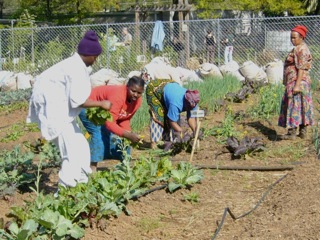At first look, urban farming in Metro Atlanta seems to be a growing trend.
But look deeper and you’ll find that for many of these farmers, it’s a way of life, rooted in cultural history. Especially for refugees, who are trying to rebuild their lives while working alongside local communities to serve each others’ needs.
Since women grow most of the world’s food, it shouldn’t be a surprise to see a farm full of Burundi women tending fields and harvesting crops. But some farms are found in unlikely places, take the garden across from the Avondale Marta Station for example.
It’s the third growing season for some 15 women and their families, who collectively farm this former school playground, nearly an acre of land, year-round.
This garden was started by Susan Pavli, project director of the Global Growers Network. She planted the garden in 2010 as part of Georgia’s Refugee Family Services.
“Right now it’s still the cool season so they have everything in the ground from leeks, to garlic, swiss chard, kale, spinach, beets, arugula and winter snow peas, right there, what we’re doing today,” says Pavli.
The Burundi Women’s Farm initiative creates agricultural and economic opportunities for refugees who were forced to flee their homes due to war, genocide and persecution.
In Burundi, these women traditionally grew the food for their households. And now they’re able to do so here.
With what they produce they can feed their families and sell the excess fruits of their labor in neighborhood farmers markets.
“The Burundi Women’s Farm gives the women an opportunity to truly become self-sufficient in a lot of different ways. In part they can grow and sell food for supplemental income,” Pavli continues “but it also provides opportunity to practice English, they work alongside American volunteers and they’re out at the market with Americans, so they’re learning the basics of American business skills.”
But they’re still shy about talking to reporters… and didn’t want to talk on tape.
Self-sufficiency is a key element of Refugee Family Services- which focuses on needs of refugee women and children. Emily Pelton is Executive Director.
“There was a real need for women to have a place to take their skills, to practice things they knew how to do and it created a whole new option for women who had farming experience, and that’s many, many women,” says Pelton.
The other important thing it creates, she says, is a way for refugees to embrace and engage the community in a productive and positive way.
“…and people can see how hard refugees want to work, how much they want to be part of this culture, part of this community.”
The United States takes in some 80-thousand refugees per year and Metro Atlanta boasts some of the largest numbers of resettlement communities.
As these new immigrants plant roots in their new homeland, Global Growers sees both the refugees and local residents reaping the benefits of their cultural skills.
Last month, Global Growers broke ground on its newest collaborative initiative, Decatur Kitchen Gardens. With assistance from city, county and local agricultural organizations, an acre and a half of land behind the United Methodist Children’s Home in Decatur will be transformed to create sustainable, organic, market gardens, which will be farmed by the local community and sold through farmer’s markets and CSA’s.
“At DKG, we plan to have about 30 community producers, probably 20-25 will be drawn from refugee community. the other people at dkg are community producers just from the local neighborhoods. We’re only just a few blocks away from a food desert, which is a place generally don’t have access to fresh foods, so we hope to reach out to those communities as well and encourage people to get involved,” says Pavlin.
This effort to bring together the needs of refugees with the interests in local farming and sustainable development is designed to benefit all who live here.

9(MDAxODM0MDY4MDEyMTY4NDA3MzI3YjkzMw004))





